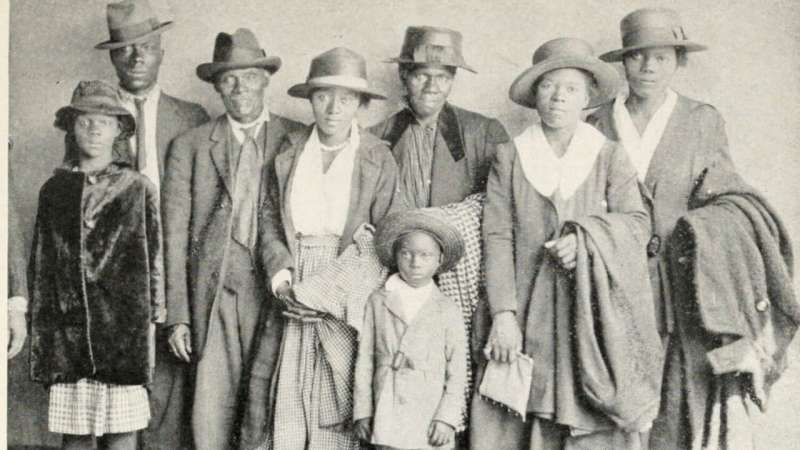Study spotlights Black social reformer, parks and rec pioneer, on Chicago's South Side

A new paper shines a spotlight on a Black social reformer and racial justice advocate whose efforts to serve the poor on the South Side of Chicago helped spark the modern parks and recreation movement.
In the journal Leisure Sciences, a North Carolina State University researcher and his collaborator describe the life of Ada S. McKinley and her contributions to both the parks and recreation movement and the settlement house movement. The researchers note that her contributions have been largely overlooked by history.
"We have tons of publications about other white social reformers, but what about Black social reformers?" said the study's lead author KangJae "Jerry" Lee, an assistant professor of parks, recreation and tourism management at NC State. "Why haven't people paid attention to McKinley, who served one of the most dangerous and impoverished corners of Chicago and made such a profound impact in the well-being of the community and the history of settlement house and park and recreation movements?"
The Abstract spoke with Lee about McKinley's efforts to launch the South Side Settlement House, which provided recreation and other programs for a predominantly African-American community in Chicago in the early 20th century.
TA: What was the main purpose of settlement houses?
Lee: Settlement houses were social service institutions usually located in poor urban areas. During the first half the 20th century, the South Side Settlement House offered a wide range of services such as housing, meals, child care, health care, adult literacy programs and recreation programs, to name a few. Political, labor and entrepreneurial organizations were also formed in the settlement house.
TA: Why was the settlement house needed?
Lee: When McKinley was serving on the South Side from the 1910s to the 1950s, the United States went through World War I, the first wave of the Great Migration, the Chicago Race Riots, the Great Depression and then World War II. Many Americans struggled and faced economic hardship and acute racial conflict.
The return of the World War I veterans and Black migrants from the South caused exponential population growth in Chicago. White veterans thought they'd have jobs, but unfortunately that was not always the case. They believed Black migrants were taking away their factory jobs. The scarcity of resources, high unemployment rates and intense racial conflict created harsh living environments in Chicago neighborhoods. The South Side Settlement House was a beacon for Black war veterans and southern migrants who were poor and marginalized. It provided much needed support for these devastated individuals.
TA: How did McKinley start the settlement house?
Lee: Her volunteering in Chicago started in 1918 with the War Camp Community Service, an organization established by the Chicago Urban League to help Black veterans. She was in charge of a recreation program, the Soldiers and Sailors Club. That's how she started serving the South Side community. When that organization lost funding, she organized a fundraiser to allow it to continue. They changed the name, and McKinley was appointed as head resident. She lived there with her husband and son, and had her offices there.
TA: What motivated McKinley to do this work?
Lee: Existing resources suggest that she developed a strong sense of service for others while attending college in Texas. Once she graduated, she wanted to go on a missionary trip, yet her father disapproved. But she focused on illiteracy among African Americans and got a teaching job.
There is not much information about her life from the late 1800s to the late 1910s. Yet, in 1918, almost at the age of 50, she refocused on helping others by volunteering at the War Camp Community Service.
I think it's really remarkable that her altruism and humanitarian activities continued throughout her life despite significant financial and personal challenges.
TA: What role did this play in the parks and recreation movement?
Lee: The playground and recreation movement was in the emerging stages during the early 1900s. The idea was that individuals need to spend their free time in a constructive and meaningful way, otherwise they will be drawn into deviant and undesirable activities. By programming their free time, the idea was that they would become productive members of society.
Many settlement houses implemented a variety of recreation activities for building character, including physical activities, games and arts, and crafts. The recreation and settlement house movements—they went hand in hand.
TA: What made you want to highlight McKinley?
Lee: There are numerous articles and published materials about the settlement house movement and the birth of parks and recreation movement in the United States. Yet, all of those publications are dominated by the stories of rich and influential white Americans. Where is the history of people of color and their contributions to the advancement of American society? I wanted to give a voice to her and provide a more balanced perspective.
Coming from a more modest background and being an African-American woman, McKinley devoted her entire life to helping the poor, people of color and less fortunate people. She is an unsung heroine.
More information: KangJae Jerry Lee et al. Ada S. McKinley: A Hidden History of Africa American Settlement House in Chicago, Leisure Sciences (2020). DOI: 10.1080/01490400.2020.1830904
Provided by North Carolina State University



















